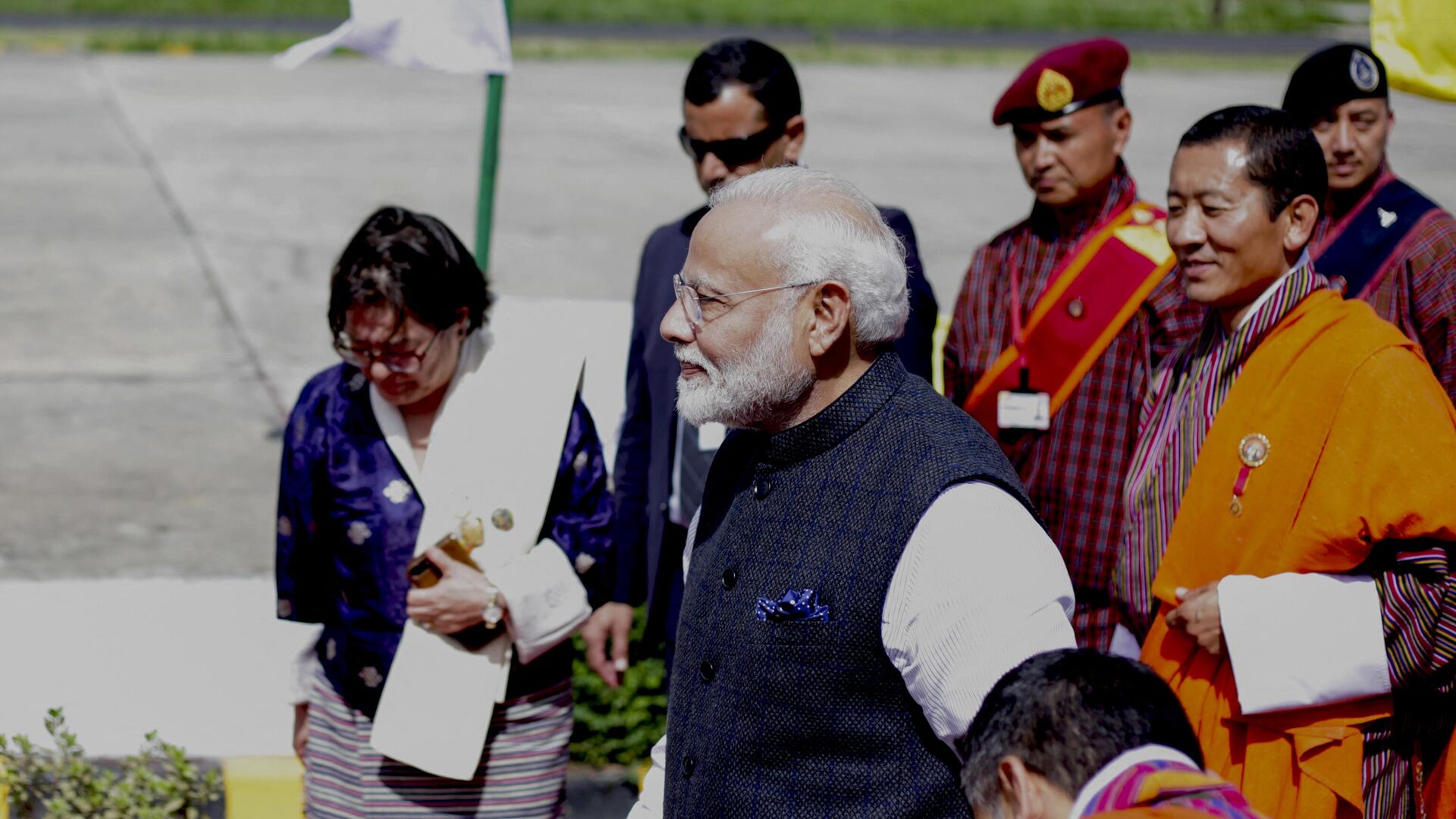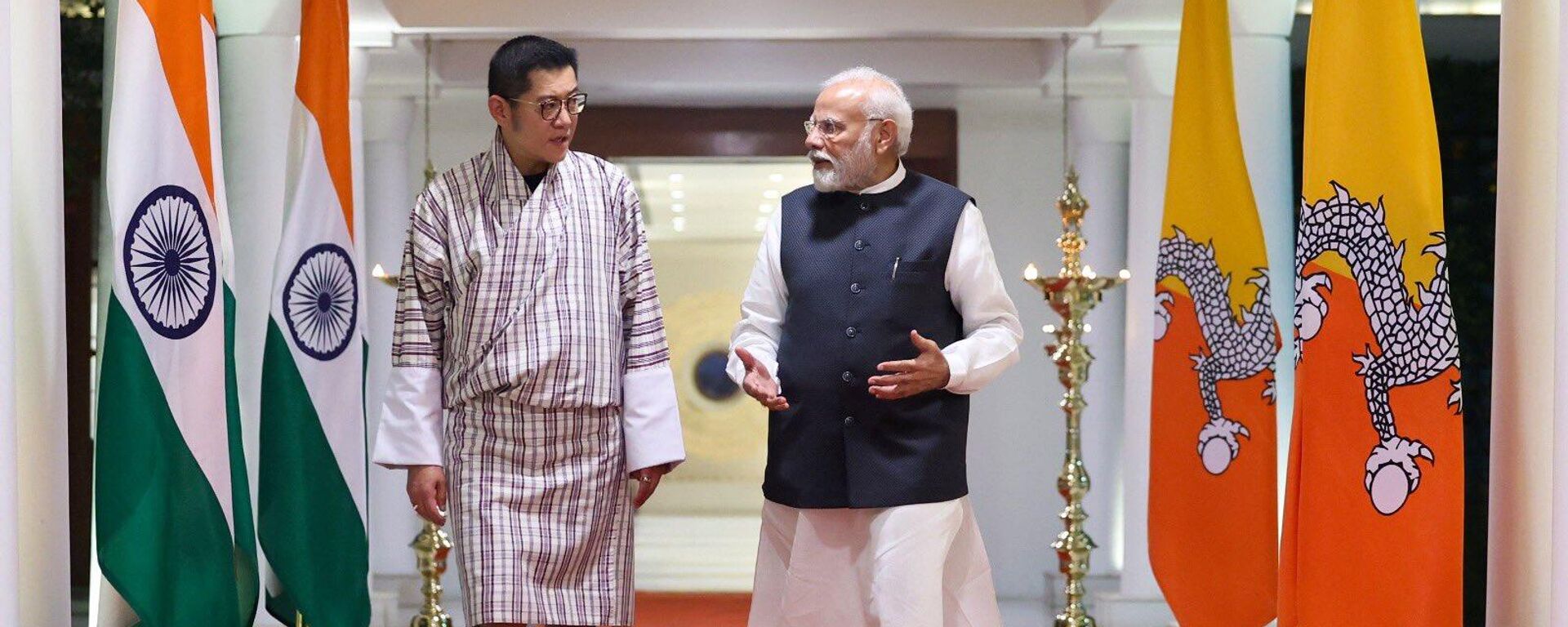What's India's Stance on Bhutan-China Border Issue?
18:18 07.11.2023 (Updated: 19:08 07.11.2023)

© AFP 2023 UPASANA DAHAL
Subscribe
Bhutan is the only south Asian nation with which China doesn’t have any formal diplomatic or trade relations. Last month, both the governments said that they would like to develop bilateral ties.
Bhutanese King Jigme Khesar Namgyel Wangchuk’s week-long visit (3-10 November) to India takes place barely two weeks after China and Bhutan held the 25th round of ‘Boundary Talks’ in Beijing in a bid to resolve their decades-old border issue.
The Bhutanese king’s visit is being keenly-watched in India, which has remained Thimpu’s closest economic and defense partner since the two nations inked a friendship and mutual defense treaty in 1949.
The reason is simple. Bhutan and China are trying to resolve the ownership of nearly 760 square kilometers of disputed territory, including the Doklam Plateau at the tri-junction of India, China and Bhutan.
In line with its mutual defense treaty obligations, New Delhi dispatched troops to the Doklam trijunction in August 2017 in order to prevent the People’s Liberation Army (PLA) from laying a road to the region. Indian security analysts say that China’s control over Doklam would directly threaten the security of ‘Chicken-neck corridor’, a narrow strip of land connecting Indian mainland to the northeastern states.
However, since the August 2017 standoff, Bhutan and China have vowed to expedite the resolution of the border dispute and signed a ‘Three-Step Roadmap’ in 2021. During the Boundary Talks in Beijing last month, both the countries also expressed a desire to establish diplomatic relations.
“The conclusion of boundary negotiations and the establishment of diplomatic relations between China and Bhutan fully serve the long-term and fundamental interests of the country and nation of Bhutan,” Chinese foreign minister Wang Yi told his Bhutanese counterpart Tandi Dorji after the meeting.
The top Chinese diplomat also expressed his desire to “fix and develop China-Bhutan friendly relations in legal form”.
Mindful of India’s concerns over Doklam, Bhutan has maintained that the Doklam dispute would only be resolved with the involvement of India, according to an interview by Bhutanese Prime Minister Lotay Tshering to Belgian media in March.
In the same interview, Tshering stated that Bhutan didn’t have any “major border problems” with China and demarcation of boundary with China would be completed within “one or two meetings”.
China-Bhutan Border Talks Have Serious Implications for India, Academic Says
Dr Hemant Adlakha, the Vice-Chairperson and Honorary Fellow at New Delhi’s Institute of Chinese Studies (ICS), told Sputnik India that Bhutan and China have been holding border talks since 1984.
“So, what is new about the warming Bhutan-China dialogue now? I think it is all to do with two recent developments initiated by Beijing,” stated Adlakha, who is also an Associate Professor at the Centre for Chinese and South East Asian Studies at New Delhi’s Jawaharlal Nehru University (JNU).
He explained that Beijing has been demanding from Bhutan the “return” of Bhutan-controlled Sakteng Wildlife Sanctuary, which is located close to Arunachal Pradesh (claimed by India but disputed by Beijing), since the border clashes in Galwan Valley in June 2020.
Adlakha highlighted that the sanctuary was previously not a part of the Bhutan-China border dispute.
“And the other initiative is the ‘three-step roadmap which Beijing and Thimphu agreed in October 2021,” the academic stated.
“It is the hurried pace with which Beijing-Thimphu have made progress towards realizing twin goals of boundary demarcation and normalising diplomatic relations - in precisely that order - which is making New Delhi pay special attention to Bhutan's new momentum in moving closer to Beijing,” Adlakha reckoned.
He cautioned that any move by Thimpu towards Beijing would have “very serious strategic implications not only for India's security concerns but also for India's relations with China”.
How is India Reacting to Thaw in Bhutan-China Relations?
Professor SD Muni, a former special envoy of the Indian government, told Sputnik India that New Delhi has been “wary” of diplomatic ties between Bhutan and China.
“But for the last five to seven years, it has becoming increasingly difficult for India to convince Bhutan,” remarked Muni, a professor emeritus at JNU.
The academic described the Doklam standoff as a “turning point” for Bhutan-China relations.
“Bhutan realized the importance of having a stable relationship with China. My sense is that Bhutan made it clear to India that it would like to go ahead in establishing relations with China during the visit of the Bhutanese Prime Minister to India in April this year,” Muni reckoned.
The former Indian envoy however opined that in spite of its apprehensions, New Delhi has likely “reconciled” to the fact that Bhutan would eventually have diplomatic relations with China.
"A prospective Bhutan-China diplomatic relationship is certainly bound to grow in the economic domain, including in the BRI framework,” Muni remarked.
In fact, all the other countries in south Asia, barring India, are part of Beijing-backed Belt and Road Initiative (BRI).
While Bhutan has embassies in over 50 countries, its relations with all the permanent members of the UN Security Council are managed by New Delhi.
India has served as landlocked Bhutan’s only window to the outside world, with most of Thimpu’s trade being routed through India.
Muni noted that New Delhi, through expanding connectivity and trade linkages with Bhutan, is trying to bolster its position as Bhutan’s foremost partner in view of anticipated normalization of China-Bhutan ties.
“India is certainly trying to impress upon Bhutan that it is full devoted to its relationship,” stated Muni.
India Offers Bhutan its First Railway Line, Concessional Loans
Muni remarked that India’s response to China-Bhutan developments was multi-layered, as evidenced by the joint statement after the talks between PM Modi and the Bhutanese king on Tuesday.
Modi and Wangchuk have agreed to further bolster cooperation in trade, technology, cross-border connectivity, mutual investments, education and people to people connections.
The joint statement underlined that India and Bhutan would undertake the ‘final location survey’ towards developing a cross-border railway connection, which would be Bhutan’s first railway network. The two leaders have also agreed to consider developing another railway link, besides committing to connect Bhutan to Bangladesh through India.
New Delhi has also agreed to develop new border checkposts in Assam and West Bengal to facilitate Bhutan’s trade with Bangladesh and third countries.
On the economic side, India will provide “bridge financing” for the period between 12th and 13th Five Year Plans of Bhutan to develop India-funded projects.
India has also assured Bhutan that it would “positively” consider the request for concessional financing in the area of skill development and capacity building, the joint statement noted.


